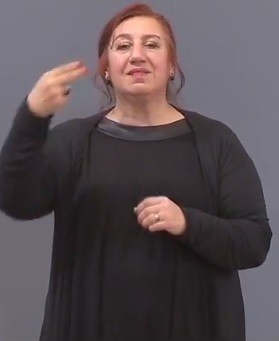There is no official data as to the number of people with hearing impairments in this country, estimations runs to around 120,000. Most are permanently employed and are, in fact, physically healthy and creative people. To many, sign language is the principal mode of communication. That is why access to the news of the day in this language is much more than a mere whim.
In recent weeks we have seen the appearance of a sign language interpreter in the central news bulletins of national TV stations in Bulgaria. The role of these interpreters has grown all the more important since a state of emergency over Covid-19 was imposed in the country, with the information about the measures and the crisis affecting us all.
There are around 200 trained sign language interpreters in Bulgaria but only 20 actually practice it. Schools, universities, medical establishments are difficult of access to people with impaired hearing.
 “But there is a way to make such accessibility available, as long as the necessary administrative measures for training are taken,” says Sylvia Marinova, one of the most experienced sign language interpreters in the country.
“But there is a way to make such accessibility available, as long as the necessary administrative measures for training are taken,” says Sylvia Marinova, one of the most experienced sign language interpreters in the country.
“I have more than 30 years of experience as a sign language interpreter and what I would like to state is that deaf people have always been left somewhere in the periphery of our society. Nobody appreciated how important it is to be able to hear. Hearing is one of the leading sensory organs and it plays a leading role in all people’s mental health. This segment of society consists of voters as well as taxpayers. They need, they are entitled to obtain information, to being educated in their language, the language they understand best. I know that for one year the Ministry of Education, and 20 organizations of people with impaired hearing, have been working hard to draft a law on sign language. If such a law is adopted soon that would guarantee their rights to information accessible in their language.”
Since 13 March Sylvia Marinova’s life changed significantly because since early morning she has to interpret, on air, the stream of news which directly affects our lives:
 “I get up early, at 5, so as to be able to get some exercise, marshal my thoughts and get in good form for the translation. At 7.30 I have to be in the Council of Ministers building for the regular briefing. My work day continues as an interpreter for the news at one of the leading national TV stations. When I get home I get video calls from different groups of deaf people and I do what I can to help. Because social isolation, shutting ourselves up at home, all of this disturbing news affect people with impaired hearing in exactly the same way. They are no different from any of us, but they do have one big problem – accessing information in their own language. There are people who ask us about things they have not understood, things that affect them personally. These people have additional qualities which make up for the lack of hearing, they are capable of working at full capacity and are extremely detail-oriented. They deserve more respect because they are exceedingly diligent and trustworthy. To deprive them of the right to obtain timely information, to be trained and educated by means of sign language is like taking the white cane from a blind man. Until recently society didn’t realize just how important sign language interpretation is for these members of society.”
“I get up early, at 5, so as to be able to get some exercise, marshal my thoughts and get in good form for the translation. At 7.30 I have to be in the Council of Ministers building for the regular briefing. My work day continues as an interpreter for the news at one of the leading national TV stations. When I get home I get video calls from different groups of deaf people and I do what I can to help. Because social isolation, shutting ourselves up at home, all of this disturbing news affect people with impaired hearing in exactly the same way. They are no different from any of us, but they do have one big problem – accessing information in their own language. There are people who ask us about things they have not understood, things that affect them personally. These people have additional qualities which make up for the lack of hearing, they are capable of working at full capacity and are extremely detail-oriented. They deserve more respect because they are exceedingly diligent and trustworthy. To deprive them of the right to obtain timely information, to be trained and educated by means of sign language is like taking the white cane from a blind man. Until recently society didn’t realize just how important sign language interpretation is for these members of society.”
“80 hours in the country everyone wants to leave”, this is the title of a video from Bulgaria by the famous YouTubers YesTheory, Dnevnik writes. The authors of the video which, in just three days had more than 1.1 million views, ask themselves why so..
The population of Bulgaria and especially the people with low socio-economic status are among the most vulnerable groups in the EU when it comes to climate change. There are a few reasons for this. There is a large share of poor..
Navigation conditions along the River Danube will be improved with the EUR 10 million European project DISMAR , the Bulgarian news agency BTA reports, quoting Ivelin Zanev, CEO of the Executive Agency "Exploration and Maintenance of the..

+359 2 9336 661
